

Probiotics: Scam or Superfood? Probiotic-crammed foods and pills are marketed as charmers of the human microbiome — and the key to immune, gut and brain health.

But how much does the microbiome actually matter, and do probiotics live up to the hype? To learn more we talked with biomedical engineering professor Ilana Brito, immunologist Dr. Yasmine Belkaid, psychiatry professor Ted Dinan, and microbiologist Dr. Namrata Iyer. UPDATE 8/28/20: An earlier version of this episode said there was a little bit of evidence that specific microbes can help with irritable bowel disease. Here’s a link to our transcript: This episode was produced by me, Wendy Zukerman, with help from Nicholas DelRose, Rose Rimler, Meryl Horn, Michelle Dang, Sinduja Srinivasan, and Hannah Harris Green.
Lab-Grown Meat: We Grill It. Silicon Valley seems to be constantly pumping out "solutions" to fix our broken food system.
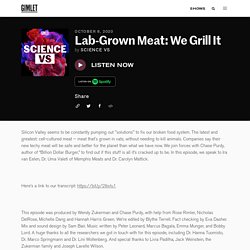
The latest and greatest: cell-cultured meat — meat that's grown in vats, without needing to kill animals. Companies say their new techy meat will be safe and better for the planet than what we have now. We join forces with Chase Purdy, author of “Billion Dollar Burger,” to find out if this stuff is all it’s cracked up to be. In this episode, we speak to Ira van Eelen, Dr. Uma Valeti of Memphis Meats and Dr. Here’s a link to our transcript: This episode was produced by Wendy Zukerman and Chase Purdy, with help from Rose Rimler, Nicholas DelRose, Michelle Dang and Hannah Harris Green.
Short Wave: Scientific Sankofa And The Complexities Of Genetic Ancestry on Apple Podcasts. Short Wave - Pandemic Could Roll Back Advancements For Women in STEMM on Stitcher. TED Radio Hour: Climate Mindset. TED Radio Hour: An SOS From The Ocean on Apple Podcasts.
Asha de Vos (marine biologist) – the importance of whales Ayana Elizabeth Johnson (marine biologist) – reconsidering what we eat from the ocean Alasdair Harris (marine biologist) – Madagascar and coastal conservation Sylvia Earle (oceanographer) – her exploration and quest to protect our oceans for more than half a century – andersonj46
Climate of Complete Certainty. This is Bret Stephens’s first column.
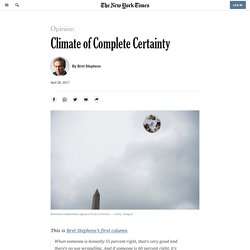
When someone is honestly 55 percent right, that’s very good and there’s no use wrangling. And if someone is 60 percent right, it’s wonderful, it’s great luck, and let him thank God. But what’s to be said about 75 percent right? Wise people say this is suspicious. Well, and what about 100 percent right? In the final stretch of last year’s presidential race, Hillary Clinton and her team thought they were, if not 100 percent right, then very close. Right on the merits. Do Republicans finally want to fight climate change? Unexplainable: How do animals know where to go? on Apple Podcasts. Unexplainable: A new force of nature? on Apple Podcasts. Short Wave: The Fight Over A Weedkiller, In The Fields And In The Courts - Discussion on the controversy and court battles of Dicamba, one of the most widely used herbicides in the United States. Short Wave: Overview of the history, practices, and benefits of Regenerative Farming. Short Wave: Story of how audio recordings and machine learning technology can be used to measure and predict the health of ecosystems.
Short Wave: The Science Of Wildfire Smoke. TED Radio Hour : The Next Frontier - Discussions about the feasibility and usefulness of terraforming Mars. Ted Radio Hour: What can be done to prevent the worst consequences of climate change? Ted Radio Hour: The Unknown Brain - Talks about the uniqueness of the human brain. Ted Radio Hour: How it All Began - Discussions about the origin of the planet and human life. Ted Radio Hour: Climate Mindset - How can human cooperation together help to stave off climate change. Ted Radio Hour: The Biology of Sex. Invisibilia: The Weatherman - Overview of what is known and unknown in meteorological science. Invisibilia - Stories about the pursuit of some to slow human aging and even attain immortality. Invisibila - Discussion of individual actions that can be taken to mitigate climate change.
The story of how smallpox was eradicated. The eradication of smallpox is one of humanity’s great achievements – but the battle against the virus was fought by the most unlikely of alliances.
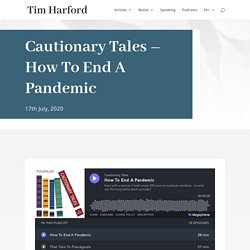
How did the breakthrough happen – and can we guarantee that the world is still safe from smallpox? Written by Tim Harford with Andrew Wright. Producers: Ryan Dilley with Peter Naughton. Sound design/mix/musical composition: Pascal Wyse. Editor: Julia Barton. Thanks to the team at Pushkin Industries, Heather Fain, Maya Koenig, Mia Lobel, Carly Migliori, Jacob Weisberg, and of course, the mighty Malcolm Gladwell. [Apple] [Spotify] [Stitcher] Further reading and listening The smallpox wargame is described in ‘Shining Light on “Dark Winter”.’ The Anthropocene Reviewed. The Anthropocene is the current geological age, in which human activity has profoundly shaped the planet and its biodiversity.
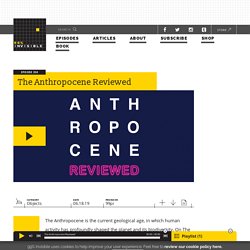
On The Anthropocene Reviewed, John Green rates different facets of the human-centered planet on a five-star scale. This week 99% Invisible is featuring two episodes of The Anthropocene Reviewed in which John Green dissects: pennies, the Piggly Wiggly grocery store chain, a 17,000-year-old cave painting, and the Taco Bell breakfast menu. Plus, Roman talks with John about the show, sports, and all the things we love now, but hated as teenagers. This podcast is a co-production of Complexly and WNYC Studios. John Green is a #1 New York Times bestselling author (The Fault in Our Stars, Turtles All the Way Down) and maker of entertaining and educational videos with his brother Hank Green. 99% Percent Invisible: On Beeing - An overview of commercial pollination practices combined with the history and future of beekeeping.
Driving between Oakland and Los Angeles in February offers glimpses of a spectacular scene — neat, symmetrical rows of trees covered with pink and white flowers, stretching on for hundreds of miles.

This is the annual California almond bloom. Almond trees take up a million acres of land in the state’s central Central Valley region. 99% Invisible: The Natural Experiment - Stories about the unique opportunities available to science researchers due to the Covid-19 Lockdowns. Summer is normally cruise ship season in Southeast Alaska.
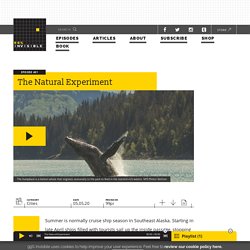
Starting in late April ships filled with tourists sail up the inside passage, stopping at little coastal port towns. 99% Invisible: Masking for a Friend - History of the use of masks during pandemics and epedemics. In January, reporter Rebecca Kanthor set out to travel across central China from her home base in Shanghai, making her way to her in-laws home for Chinese New Year.
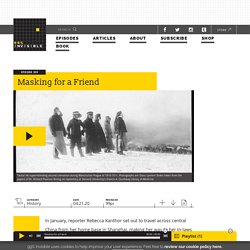
As she walked out the door and put a location into her GPS app on her phone in a robotic voice instructing her to “Please wear a mask if you’re going out. Be safe.” A week later when she returned home to Shanghai, the change was even more drastic. Anyone who ventured outside was wearing a mask. There were public service posters all over reminding people to wear masks. The Great Manchurian Plague. The United States of Anxiety: The Birth of Climate Denial & a history of the famed 1925 Scopes Trial. Starting with the 1925 Scopes Trial — also known as the "trial of the century" — we look at one of the most controversial topics in our time: the debate over evolution versus a Fundamentalist understanding of the Bible.
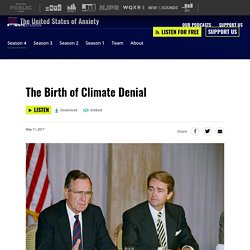
It started with a substitute teacher in Tennessee who believed that evolution should be taught in the classroom. What followed was a fiery debate that rocketed around the world. The United States of Anxiety : How should climate be discussed in the classroom ? While reporting on the Birth of Climate Change Denial, an episode for the United States of Anxiety podcast, we asked listeners and science teachers across the country to tell us about the challenges of teaching climate change.
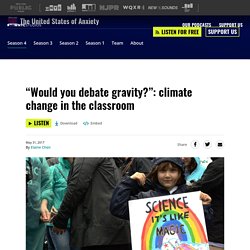
Below is some of what they had to say. For over a hundred years, the teaching of evolution has been the subject of debate in pockets of the U.S. And within the last decade or so, climate change has emerged as another area of science that is societally controversial, though scientifically established. Every year, about a dozen states consider proposals that allow or encourage teachers to present the “strengths and weaknesses” of scientific theories. Radiolab:The Primordial Journey - Timeline of the human embryo's production of first tissues and organs. JAD ABUMRAD: Hey, this is Jad. Very proud to present to you guys starting today here on Radiolab, a miniseries from producer Molly Webster. [CHOIR: "It's been a my goal as a fish. It's been my goal. For so long I've waited to be full.
I've waited to carry you. This American life: I Think We’re Alone Now - Trying to answer the question of whether we are alone in the universe. Radiolab: Fronags - Overview of the new experimental process of freezing ovaries. MOLLY WEBSTER: This is Gonads, episode two. I'm Molly Webster. MOLLY: Okay, my dashboard says it's 12 degrees outside. It's all ... MOLLY: Okay. So in January, I went to Erie, Pennsylvania. MOLLY: Second attempt at Erie. Radiolab: X & Y - What are chromosomes and what do they really determine? MOLLY WEBSTER: Gonads, episode three. I'm Molly Webster. MARY WEBSTER: Hello? MOLLY: Hello, are you still there? MARY WEBSTER: I'm still here. Radiolab: Dutee - Episode that uses the story of female track athlete who was banned from events due to high natural levels of testosterone to discuss testosterone. JAD ABUMRAD: Hey, this is Jad. Before we start, in case kids are listening, just know that this episode contains -- well, Molly curses a little bit in this one.
I do too. The Daily: The Vaccine Trust Problem - The antivax movement and what the implications are for a coronavirus vaccine. Michael barbaro From The New York Times, I’m Michael Barbaro. This is “The Daily.” Today: Public health officials are vowing to develop a coronavirus vaccine in record time. My colleague, health reporter Jan Hoffman, on how that speed could backfire. It’s Tuesday, July 21st. archived recording Thank you, very much, Mr.
Jan hoffman So late last month, Dr. Radiolab: Dana - An overview of Intersex people. MOLLY WEBSTER: Before we get started, this episode has a lot of strong language including repetitive f-bombs strung together to a beat. Radiolab: Infective Heredity. Radiolab: The Beauty Puzzle - How does beauty play into the story of evolution? Radiolab: There and Back Again - Story about how and why animals are able to migrate such incredible distnaces. JAD ABUMRAD: Hey, I'm Jad Abumrad. ROBERT KRULWICH: I'm Robert Krulwich. This is Radiolab. Radiolab: Man Against Horse - How and why did humans evolve with butts? JAD ABUMRAD: Hey, this is Jad. Before we start the episode which will happen in a few seconds, I just want to give a quick peek behind the Radiolab curtain. So Radiolab is a team of about 20 people, and that includes, you know, reporters, producers, fact-checkers, Robert and me.
Radiolab: Body Count - A look at the myth that more people are alive now then in all of Human history. JAD ABUMRAD: Okay. Radio Lab: Ignaz Semmelweis - The story of when we started washing our hands. JAD ABUMRAD: Okay. Hey I’m Jad Abumrad. This is Radiolab dispatch number two. JAD: This is a story that we’re all living out 20, 30, 50 times a day, in 20 second bursts. It’s a story I didn’t really know about but when this whole corona crisis was new, just -- I mean it seems like it’s been years, but just two weeks ago. Radiolab: Dispatches from 1918 - Overview of the 1918 pandemic. Radiolab: Space. JAD ABUMRAD: Hey everybody, it's Jad. Okay, I want to announce something that's kind of new. You know, we've been making Radiolab for a long time, almost 20 years. Why Fish Don't Exist. Dispatch 6: Strange Times.
RadiBaby Blue Blood Drive.